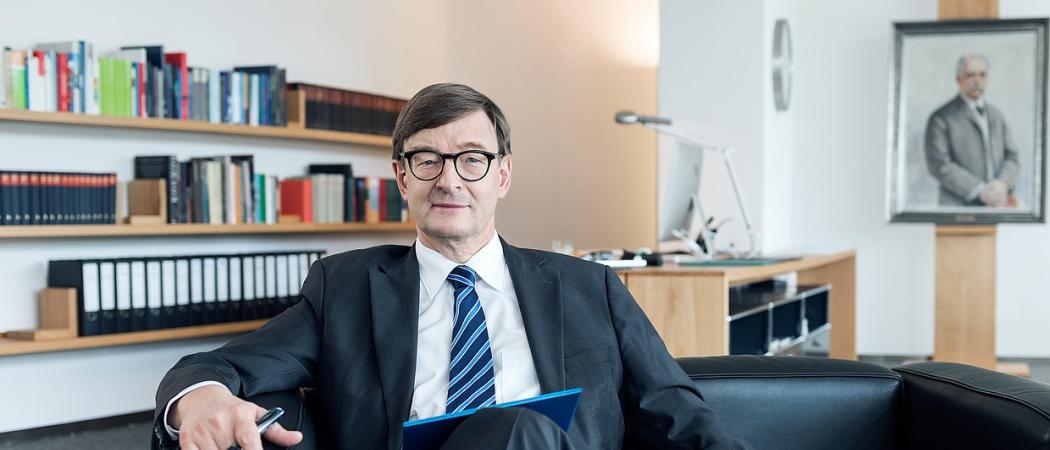President of Germany’s biggest science organisation sounds the alarm on falling science investment in more than half of EU member states

Otmar Wiestler, president of the Helmholtz Association. Photo: Steffen Jänicke / Helmholtz-Gemeinschaft
The head of Germany’s largest research organisation is calling for action to arrest sliding science investment in Europe – and warns Brexit will weaken the continent’s research base still further.
“We face a serious research divide in the EU,” said Otmar Wiestler, president of Helmholtz Association. What’s at stake is Europe holding on to its advantages in science, engineering and innovation. “Fifteen-plus countries have strongly fallen behind. This in my view is a real threat, even more so when the British leave the EU.”
Countries battered by the 2008 financial crash, such as Portugal, Spain and Greece, have struggled to bring research funding levels back up.
This threat of research stagnation is often keenly felt in Europe, even if it’s not a unique concern.
Last week, the Organisation for Economic Cooperation and Development said the government share of GDP dedicated to R&D spending across the developed world dropped by four percentage points from 2009 to 2016, from 31 per cent to 27 per cent.
Helmholtz employs some 39,000 scientists and technicians at 19 centres and has an annual budget of €4.5 billion. Wiestler said Helmholtz is acting defensively against the danger of underinvestment in other countries. The organisation “feels a responsibility to strengthen and stabilise” research across Europe, he said.
Leaders at the organisation’s 19 research centres are encouraged to identify partners and train top talent in southern, central and eastern Europe, where typically government investment in science is lower.
Recent Helmholtz collaborations include establishing a new cancer centre in Athens and an immunology centre in Croatia. “We strongly encourage local officials to make contributions, too. It has started to work out in Greece,” Wiestler said.
In the same spirit of increasing investment in Europe, Wiestler says the EU’s 2021-2027 programme, Horizon Europe, should be opened wide to non-EU countries.
“I’m a big supporter of opening up; additional partners guarantee added value, so long as it’s a programme coordinated by the European side. We should open up the second pillar for selected high quality foreign partners, who should pay their own bill.”
But, he added, access to the European Research Council should not fundamentally change. “I would be hesitant about opening up the ERC – it’s a European brand, and not global,” Wiestler said. He wants to see ERC grants remain open for international talent, but continue to limit eligible host institutions to EU members, Switzerland, Norway, the UK and Israel.
And the UK is welcome to join Horizon Europe provided, “they pay their share”, said Wiestler.
Expanding outwards
Researchers at Helmholtz gain access to some of the world’s most advanced science equipment, from synchrotrons and research airplanes, to vessels and research stations in remote locations like the Antarctic. “The things we do and the large research infrastructures we provide access [to] are real magnets for international scientists,” Wiestler says.
To attract more foreign scientists, Helmholtz has recently opened a new outpost in Tel Aviv, Israel. The country “is leading in information and data science, and is very strong in fields like energy research, water, life sciences and earth,” said Wiestler. “I would [also] like us to learn from the Israeli start up community.”
Collaboration with Chinese researchers is on the rise too. However, it is “not an easy partner,” Wiestler said. “We have many Chinese postdocs and scientists at our research centres and right now we are re-considering our strategy towards the country. We are in a competitive situation [and] whenever we do agree on cooperation, we have to be very clear what the rules are,” he said.
Helmholtz also maintains an outpost in Russia, where a rich science legacy has faded due to government neglect. “I feel it is important to maintain our relationship to Russia and Russian scientists – [but] in some areas Russia is facing a serious brain drain,” said Wiestler.
Helmholtz recently subjected its centres and 32 research programmes to an unusually rigorous international peer review, involving 32 panels of more than 630 international experts.
“We got a lot of very positive feedback,” said Wiestler. “We also identified areas where we should adapt directions. Our strategic evaluation taking place this year will see whether and how to incorporate these changes into our future programmes.”





 A unique international forum for public research organisations and companies to connect their external engagement with strategic interests around their R&D system.
A unique international forum for public research organisations and companies to connect their external engagement with strategic interests around their R&D system.